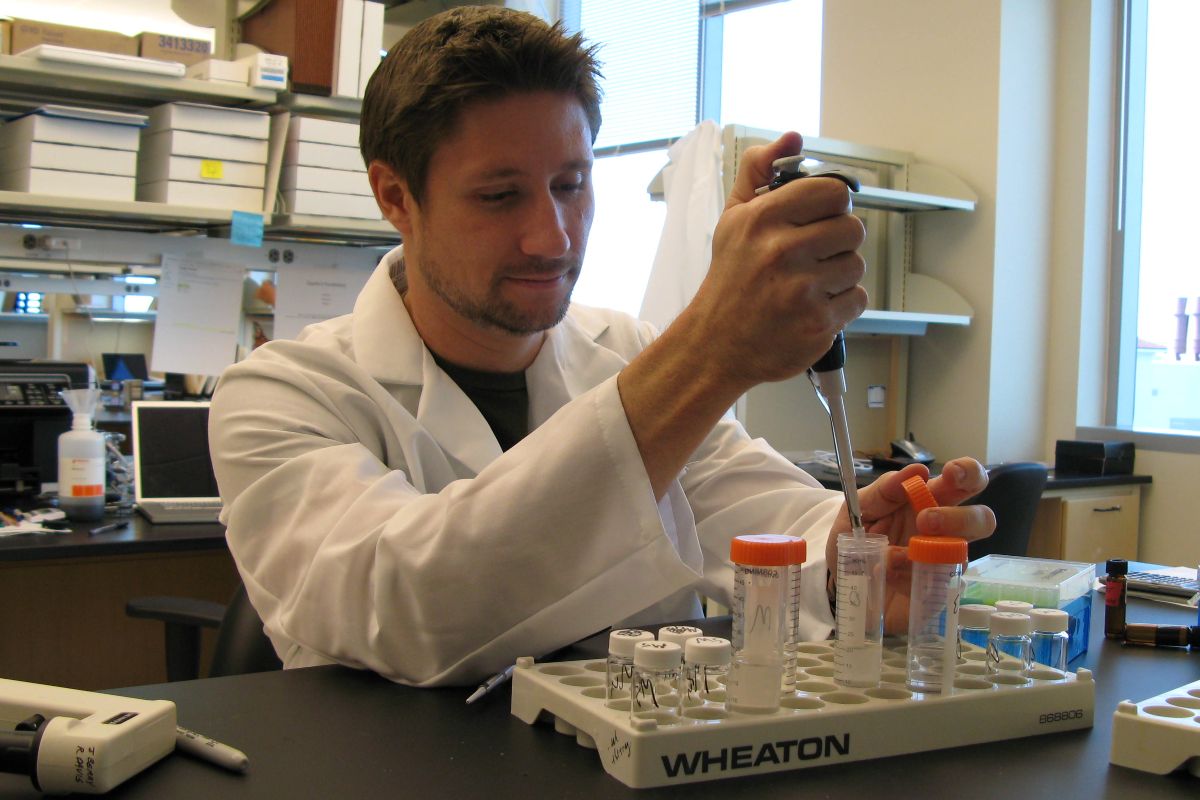
New faculty member Jacob Berry is pictured here during his postdoctoral fellowship at the Scripps Research Institute in Florida, USA. Image credit: Trina Kemp
What makes some memories stronger than others? And what is the relationship between memory, forgetting, and mental illness? It is these questions that drive the research of new assistant professor in the Department of Biological Sciences, Jacob Berry.
“Research into the neurobiology of forgetting will have a great impact on our understanding of mental illnesses that involve memory problems,” explained Berry, who joins the University of Alberta from the Scripps Research Institute, where he was staff scientist.
“Some of these illnesses include accelerated forgetting in dementia, or the inability to forget harmful or inappropriate memories, like drug memories that cause relapse during drug addiction, or traumatic associations with post-traumatic stress disorder.”
Join us in welcoming Jacob Berry.
What brought you to the University of Alberta?
What initially attracted me to the University of Alberta is the opportunity to be a part of a large vibrant university community with a diverse intellectual ecosystem, offering many opportunities to learn and be exposed to new and exciting research and knowledge. Perhaps just as critical, UAlberta gave me the opportunity to work down the hall from my wife, Anna Phan, another new faculty member in the Department of Biological Sciences. Finally, I spent many summers as a child camping in the Rocky Mountains in Colorado and Montana, therefore the chance to do research and teach just hours from the even grander Canadian Rockies was hard to pass up.
Tell us about your research program.
Broadly speaking, my research program is focused on understanding the neurobiology of memory. My laboratory aims to uncover the genes, neurons, and brain circuits that regulate the formation of memories, and subsequently modify memories to cause forgetting. To address this, we work with the fruit fly—Drosophila Melanogaster—as a model organism for its optimal balance of complex behaviors and a relatively simple nervous system.
My laboratory employs interdisciplinary and innovative techniques to address these complex problems, including advanced proteomics, behavioral genetic assays, and in vivo functional imaging. To date, my research has revealed that the dopamine signaling system, consisting of specific neurons and dopamine receptors, has a dual role in both forming memories and modifying them during forgetting.
What questions do you aim to answer?
My lab aims to answer two broad questions: what are the fundamental biological mechanisms that control the strength of memories, and how do these mechanisms go wrong in people with mental illnesses? For example, we are currently working on constructing some of the genetic networks that function during learning and forgetting. As we develop our understanding of these networks involved during normal forgetting, we seek to explore how these mechanisms change in models of mental illness.
Why is this an important field of study?
Most of our day-to-day cognitive function revolves around our ability to form memories, preserve some of them, and flexibly change others. Research into the neurobiology of memory—in particular, forgetting—will have a great impact on our understanding of mental illnesses that involve memory problems, such as accelerated forgetting in dementia or the inability to forget harmful or inappropriate memories, like drug memories that cause relapse during drug addiction, or traumatic associations with post-traumatic stress disorder.
What inspired you to enter this field?
When I was an undergrad studying for a degree in physics, I took a few biology courses that forever changed my academic path after I graduated. Coming from studying systems in physics that had only a few objects, I was amazed at the intricately complex systems in biology and the phenomena that arise from these complex systems. I became very attracted to neurobiology specifically because some of the most interesting phenomena, like cognition and memories, emerge from the most complex system we know of: the brain.
Tell us about your teaching.
After I get my lab up and running, I have broad interests in teaching molecular genetics, physiology, or animal biology. I am also very interested in more hands-on laboratory courses, such as GENET 375 - Introduction to Molecular Genetics.
Why is teaching important to you?
I feel that education is a critical responsibility within a society. I view teaching as an opportunity for me, as someone who has benefited so much from education, to give something back and hopefully help grow future scientists and leaders.